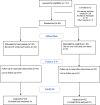The effect of maternal-fetal attachments skills training among unintended primigravida women: a randomized controlled trial
- PMID: 40022016
- PMCID: PMC11869609
- DOI: 10.1186/s12884-025-07329-1
The effect of maternal-fetal attachments skills training among unintended primigravida women: a randomized controlled trial
Abstract
Background and objectives: An unintended pregnancy can lead to an unfavorable relationship between the mother and infant and also include pregnancies that, although unintended, become wanted and may not have the same risks. This study aimed to investigate the effect of attachment training on maternal and fetal attachment in women with unintended pregnancy.
Method: This clinical trial study was conducted in 2019 on 84 women (two groups of 42 subjects) with unintended pregnancies (at least 28 weeks in the third trimester of pregnancy) in selected clinics affiliated with Shiraz University of Medical Sciences. Cranley's Maternal-Fetal Attachment Scale (MFAS) was completed before and after the intervention in both groups; a demographic information questionnaire was filled out and written consent forms were signed before the intervention in both groups. Then, attachment training classes were conducted for 6 sessions of 90 min in the intervention group, while the control group received only routine pregnancy care. Chi-square, Fisher and independent t-test were used to analyze the data.
Findings: The mean scores of maternal-fetal attachment before attachment training in the experimental (57. 24 ± 5.03) and control groups (57.29 ± 6.96) were not significantly different (P = 0.86). Based on the results of independent t-test, the mean scores of maternal-fetal attachment after training in the intervention (66.43 ± 1.76) and control (57.14 ± 5.03) groups were significantly different (P = 0.0001).
Conclusion: The findings of this study showed the positive effect of education on the attachment behaviors of mothers with unintended pregnancies. Therefore, it is recommended that attachment skills training should be used in prenatal training programs.
Trial registration: Iran Randomized Clinical Trial Center registration IRCT20130710013940N5, Date of first trial registration: 2019.02.02.
Keywords: Education; Maternal–fetal attachment; Train; Unintended pregnancy.
© 2025. The Author(s).
Conflict of interest statement
Declarations. Ethics approval and consent to participate: All procedures performed in studies involving human participants were in accordance with the 1964 Helsinki Declaration and its later amendments or comparable ethical standards. This study was approved by the Ethics Committee of Shiraz University of Medical Sciences with the code number of REC1397.100. Moreover, the study is also registered on the clinicaltrials.gov website under the registry number 20130710013940N5. The date of the first trial registration was 2019.02.02. Participants were informed about confidentiality and signed a written informed consent before participating in the study, also the ethical approval and consent to participate were obtained. Consent for publication: Not applicable. Competing interests: The authors declare no competing interests.
Figures
References
-
- Bayrami R, Taghipour A, Ebrahimipour H. Experience of unplanned pregnancy in women attending to health centers of Mashhad, Iran: a phenomenological study. Iranian J Obstet Gynecol Infertil. 2014;16(87):15–23.
-
- Khajehpoor M. Comparing the health status of women with wanted and unwanted pregnancy. J Gorgan Univ Med Sci. 2012;14(1):113–20.
-
- Aztlan EA, Foster DG, Upadhyay U. Subsequent unintended pregnancy among US women who receive or are denied a wanted abortion. J Midwifery Womens Health. 2018;63(1):45–52. - PubMed
-
- Moosazadeh M, Nekoei-moghadam M, Emrani Z, Amiresmaili M. Prevalence of unwanted pregnancy in Iran: a systematic review and meta-analysis. Int J Health Plann Manage. 2014;29(3):e277–90. - PubMed
Publication types
MeSH terms
LinkOut - more resources
Full Text Sources



